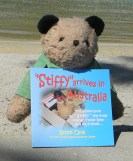
 By Stephen James
By Stephen James
Isn’t it unusual how human beings congregate together through habit and in different social environments, chattering and listening at the same time? They share their stories, both brief and epic in differing layers of intimacy, all dependent upon how well they know the individual in question. The surroundings have little impact on the quantity of divulgence. Sure as sunset, our mood can influence it. At work, it can become quite deep if the acquaintance has been elevated to friend status. Exaggerations have to be filtered or diluted down. Facts are sometimes difficult little creatures for individuals to keep aligned in their mind’s drawer. Occasions when these tend to elevate are when one person is trying to impress a member of the opposite sex. Yes, it is a world of listening, speaking, sharing, believing and disbelieving, which can be at anytime, anywhere and anybody.
Such as this place…
An icy chill had lowered its unwelcome presence at Unwark, Newhaven, on the eastern coastline of the United States. The suburb, nestled about eleven miles out of town, was connected via a splendid grid of bus routes dotted with stops. The vehicles, which ferried the commuters with magnificent punctuality into downtown Newhaven, ran practically non-stop. Newhaven’s substantial population boom, after the discovery of copper at nearby Old Soak Town, had forced its urban sprawl back in the 1940s. Unwark was one of these newer regions, the rest of the city dates back to the 1600s. On this particular day, it was 7:35 am and it was the end of January, therefore, the tail-end of winter was still wagging. The year was 1989. At bus stop number 19, on the corner of Cypress Street and Anglerfish Road, Mrs Alton, a rather large woman of fifty well-worn years, was in full flight with Mrs Dingleworth. Agnes Alton had a mouth on her like a conveyer-belt. It just never stopped. Finally, she paused for some air…
“Oh, I couldn’t agree more,” said Mrs Dingleworth in false agreement, having only been able to process about thirty per cent of Agnes’s Gatling-gun onslaught. She needed to change the subject. “Did I mention my next-door neighbour’s oddity to you?”
“No. Oh, do go on!”
“Well, they don’t usually argue as a rule. Not audibly anyway I mean. But the other day I heard him say quite loudly, that if she didn’t stop visiting the Witch’s Society; a club of silly girls who dress up and sit around casting spells on each other, then he would…”
“Would, would, would… what?”
“He said he would kill her!” She grabbed Agnes for dramatic effect, then giggled to defuse her acquaintance’s startle. “I think he suspects she’s up to no good and he is just laying down the law. I think they are actually a very loving couple.”
Several other passengers were nearby. Some listening, others oblivious to anything outside of their newspapers. Two children were bouncing a basketball non-stop from 7:03 am, which was when they arrived. A hiss of brakes interrupted their conversation. This was Joan Dingleworth’s ticket to peace and quiet. A latecomer dashed through the melting snow. It was as if the hurry-music in his head had suddenly started. Agnes waved goodbye, unfulfilled by only the story’s bait, and wanting the meaty details; hers was the next bus to Lilydale. The two children did not board either, ergo Agnes would have to endure the confounded thumping of the ball a while longer. Before her bus arrived, a gaggle of four teenage girls wearing school uniforms converged under the roof of stop 19. They were all chewing gum and speaking three at a time in very high-pitched tones, with one alternating listener. Agnes grew even more impatient, deciding to take on the chilly air outside as a way to avoid the ruckus. She only appreciated the sound of her own vocal cords. Her friend, Vera Kennedy, whose closest companion was a small Yorkshire Terrier called Bunty, approached with a wind-assisted walk. Bunty, as usual, was scampering out front at the end of his retractable leash. Boston born Vera resplendently rounded her vowels with Royal Family aplomb and was always overdressed for any occasion. She held her hand out ready to shake way before her arrival.
“Hello Agnes, honey,” she said on the hover, observing Mrs Alton’s lips on the verge of opening. “I can’t stop this morning. Meeting my new man for breakfast at Clarissa’s Pop ‘n’ Stop. He’s devilishly handsome and thinks I am wonderful. Can’t believe my luck.” She withdrew her leather glove and blew a kiss at her friend. “Ta-ta!”
“Have fun now,” replied Agnes, flicking an unimaginative wave out of jealousy.
At last the bus arrived and the bouncing ceased its monotonous rhythm.
The following Monday morning at the bus shelter, the 8:00 am commuting crowd was building toward double figures. Mrs Alton, who was busily fussing with her umbrella in expectancy of drizzle, overheard Mr Ballinger saying something to Mr Czernovski. It went like this. “Tell you what, Czernovski, did you see on the Sunday night news? That bloke from the east side of the city did his wife in with a carving knife. Tried to tell the cops it was an accident! Yeah, six accidents in a row… all around her heart!”
“Wow! that is stifling. It reminds me,” interrupted Agnes Alton, who was catching the later bus this morning, “you should have been here last week. I was speaking to a woman who had just heard her next-door neighbour threaten to kill his wife because she’s a witch.”
“A witch did you say? I don’t believe we’ve met,” said Ballinger offering his hand, “Carl is my name, Carl Ballinger and this is Jake Czernovski.”
“Yes indeed. “Death will soon be upon you!” he’d threatened. I got it straight from the horse’s mouth. An honest woman that Joan Dingleworth — straight as an arrow! My name is Agnes, but you can call me Mrs Alton. We are not on first names yet young man!”
Rotund Jake rubbed his red beard. “Oh, good golly, you can’t go around believing everything you hear Mrs Alton. People do tend to exaggerate things at times. Ballinger here is a policeman. Just ask him about some of the mountains he’s seen made out of molehills—”
She turned on him like a thunder cloud…
“Well, how rude! If you don’t mind,” cutting Czernovski short, and withdrawing her hand with a huff, “we have only just met and already you have rubbed me up the wrong way. Excuse me!” Agnes stepped forward, relieving herself of their company.
Ballinger hunkered in alongside the busybody, politely coughing her attention. “Please accept an apology on behalf of my friend and I. All Jake meant was that the Newhaven PD cannot go around investigating every single rumour that gets tossed around.” He was a fraction behind her peripheral vision and giving his friend a wink. “I do believe your friend’s concern is possibly a correct one. Say, why don’t you take my card and keep in touch if anything else arises from this? There are two numbers, one is my private home number and the other will get me at the station.” Carl offered Agnes the plain but clear piece of cardboard.
“Alright, I shall accept your apology Officer Ballinger, and your card.”
At that precise moment the bus skidded to a halt and the bifold doors opened with a hiss, but nobody alighted. A small group, including the three, squeezed onboard. It was standing room only. Czernovski and Ballinger had the displeasure of listening to Mrs Alton’s complaints about the rudeness of the younger generation of today, as well as a laboriously detailed account of her version of Mrs Dingleworth’s little tale, all the way into Lilydale. Beside them, another middle-aged woman with bright purple hair was challenging her for the airwaves with her longwinded account of her husband’s wicked ways. Her booming voice drowned Agnes’s. Finally, before she parted at the mall, the purple-haired lady’s last few words went…
“This is an amazing admission of mine, but please, don’t whatever you do, tell so and so…”
An excited Mrs Alton hurried to the bus stop early the next morning. Her nosey head bobbing about, filtering the passing crowd, in search of the remotest acquaintance who may be catching the same bus as she. One by one, the murmuring crowd began to swell. Agnes burst into full verbal action with Eric Standwater whose three, of four, pet goldfish had mysteriously passed away in the night. She had a remedy for the prevention of a similar fate for the sole remaining one. In a blink, the crowd thinned when the bus to the bay pulled up, delivering four African American college students, and whisking away most of the gathered commuters. Eric, being one of them. Agnes grew impatient in the brisk wind that had begun to swirl the gently dropping snow. She was hoping to receive an update from her bus-shelter friend, but Mrs Dingleworth was nowhere to be seen. The busybody’s head flick-flacked back and forth like a sideshow alley clown, checking the pavement. What if the brute next door had gone on a rampage and killed her?
Minutes later, those four annoying teenage schoolgirls, who cared precious little for peace and quiet, engulfed the little building in their daily squawking. Mrs Alton hated their routine hair twirling and gum chewing, not to mention how sick her ears were of listening to their boy problems. She took refuge on the other side where, at last, the familiar figure of Joan Dingleworth was approaching in full stride. Before Joan was even in earshot, Agnes began her broadside of questions about the killer. Joan knew they would be coming, she waved excitedly with her free hand, clasping a raincoat with the other. Both women’s voices met within metres — soon entwining in a venturous hen hackle. As it thinned to a respectable alternating Spanish Inquisition, stimulated by the very mention of the words “murder” and “close-by”, the accumulating crowd encircled both women.
“So, has it gotten worse since we last met?” asked Agnes, making sure they could all hear.
“Let me simply put it this way for you to decide. There I was, nonchalantly pruning my border gardens, as one does at this time of year, when I heard his voice as clear as the Liberty Bell, roughly saying; “Your shenanigans and crafty witchcraft ways do not fool me. We have a serious problem here and I need you to make up your mind how we deal with it. Without attention, unfortunately Evanora, a hasty death seems imminent!” That is her name. Evanora then replied; “Tomorrow I am visiting Jadis, Locasta, Theodora and Medea. I have to, Seth…” those are her crazy friends with witch’s names. Her husband is Seth. Then she said; “…because it is our one and only shot at a full moon.” He cut her off with a raised voice and said; “Make up your mind what is more important, but let me warn you, the days are numbered!” I was right next to the fence. It was loud and clear, Agnes.”
“Oh my gosh! What should we do?”
“Well, I for one am not going to personally interfere.”
“Have you called the police?”
“No. I wasn’t quite sure if I should. Nothing’s happened yet. Only talk. Do you think they would do something?”
Agnes assumed control. “Well, I have already informed an officer. He took me very seriously, even gave me a card with his personal home phone number on it!”
Joan grinned. “Perhaps he’s interested in a liaison. You know, of the personal kind.”
Agnes needed more sizzle on her plate. “Nonsense, but either way, we should get together socially. We have so much in common. I too like to garden in my spare time. Let me offer you my phone number and address. I can take yours down as well.” Mrs Alton rummaged around in her handbag for a pen and paper. “I am in Cypress Street at number 41.”
“Really, well my house is in Anglerfish Road at number 668. I am surrounded by trees. Evanora, the witch, lives at number 666. Kind of spooky. Don’t you think?”
Right at that very moment, Vera Kennedy was making a beeline for the packed pavement. Yorkshire Terrier Bunty’s fully extended lead had her in a water-skier tow. Mrs Kennedy had decided it was ‘sable day’ today, therefore, at this precise second she had the chance to flaunt her fur. Bunty found the centre of the group, pulling Vera shoulder to shoulder with Agnes. “Good morning fellow Unwarkians!” she trumpeted, ceasing the conversation in a twirl. “What’s the skulduggery today then?” The sable stole slipped a fraction.
“Off for another date are we, Vera?” snapped Mrs Alton, hating to be upstaged.
“Yes, but not till five past eight. He’s scrumptious — like melting chocolate, and simply can’t get enough of me!” She flicked the stole’s end back over her shoulder. “Oh, c’mon girls, I’m early… do fill me in on the latest goss.”
Another bus arrived, whisking away the satisfied crowd, and leaving the three extroverts to their exchanges. Agnes allowed Joan the privilege of divulging the story while she patted Bunty. This was rewarded with a detailed exchange of her latest conquest’s generosity, which more than made up for his awkward habit of displaying affection in public places. Vera rolled back her sleeve, revealing a stunning heart-shaped Omega.
“Latest present! Goodness me, see how it flies when you’re with good company. Must get a wiggle on, Roger will be as antsy as a blindfolded tightrope walker. One mustn’t keep a love-hungry pet unfed! Ta-ta.” She tugged Bunty from his pat and pranced toward Clarissa’s Pop ‘n’ Stop.
Joan Dingleworth watched her disappear around the street corner, envious of her trim figure and ignoring Agnes’s rude remarks. At last, their bus arrived just as a light blanket of snow began to settle. An uncharacteristically late Jake Czernovski had to grasp the top of his hat as he ran to catch the city-bound bus. His belly wobbling with each stride. His red beard held stiff in the breeze.
After a long day’s work for the law firm she had been with for sixteen years, Mrs Alton eventually put her feet up at her home in Cypress Street. In her hand was a well-earned cup of tea. On her knee was her favourite women’s magazine. Beside her lay her Persian cat, Bartholomew. She had all but forgotten about the morning’s dramatics.
Until the telephone rang…
The bumptious know-all seized the handset from its rotary dialling cradle. “Yes hello, Agnes Alton here. Who may I ask is speaking?”
The voice from the other end came, “Agnes, it is me, Joan Dingleworth!”
“This is earlier than I expected, Joan. I am a little tired this evening—”
Joan interjected, “I had to call you. Moments ago, I was watering over by the fence and I heard him on the telephone. It’s happened!”
“What has happened?”
“The murder! I distinctly heard Seth saying; “I’ve got her body in a bag. Hurry up and get home, will you? I want to make sure we dispose of it properly!” Joan was overwhelmed with excitement. “I don’t know who he was talking to or who has been killed but I heard it as clear as crystal.”
“Stay put Joan and don’t panic. I shall call Officer Ballinger immediately. He told me he lives close by. Do not go over there. Do you hear me!”
“No, of course not. I’m not that silly. Please hurry!”
Agnes practically dialled the numbers off her old-fashioned phone. She heard Carl Ballinger’s voice. He was in his pyjamas watching television.
“I told you, Officer Ballinger!” she squawked, offering a highlighted rendition of her friend’s eavesdropping. It finished, “… now you must come at once, Joan is very concerned for her own safety. I must be there to comfort her. Can you pick me up on the way through?” She gave him her address and no alternative. “I’ll be waiting out front.”
“Call that other number on my card, Mrs Alton, it will get straight through to my colleagues,” he stressed. “Relay your message and tell them we’ve spoken. I must have some backup. I’m on my way!” Carl pulled on a pair of trousers straight over the top of his pyjamas and wrestled on a shirt, boots without socks, and a departmental storm jacket. He had no time to lose. Being a beat walker, the concerned policeman had to use his own car.
Feeling as though she was a very important link in the chain of events, meddler Agnes Alton made the two calls. One telling the police to hurry along to 666 Anglerfish Road, the other to Mrs Dingleworth, letting her know she’d taken care of matters. Minutes later, after locking Bartholomew safely in her orchid house next to the garage, she stood freezing outside under the streetlight. Hurrying to the epoch-making event, off-duty Ballinger whisked her away; the gloomy chill-filled darkness of nightfall seemed to be following them to the crime scene. They pulled up in front of number 668 Anglerfish, shrouded by a row of kerbside hedge maples. Observant Carl saw Joan behind the front door — security chain in place. He tiptoed in front of her, close by the porch. Her fingers were protruding between the gap, and wiggling about, pointing to her neighbour. She began to utter a few words, but he hushed her with his forefinger to his lips as his footprints marked her snowy front lawn. Ballinger’s senses heightened with each step, eyes scanning — ears pricked — nose drawing deep smooth breaths. The neighbourhood lay in silent wait. With identity badge firmly clasped, he climbed the five wooden steps completely mindful of the horrific danger that may be lying behind that front door. He knocked firmly. “Anyone home? Hello, is there anybody inside?”
Nothing but the wind in the trees. Carl looked to the street which fed from the main road for his backup patrol car. There were no saving headlights, he had to go alone. He knocked stridently once more. “Open up, this is the police!”
But again, there was no answer. He increased the strike. Still no answer…
Was he too late?
Suddenly, his peripheral vision noticed a pair of headlights turning into the street at the same time as the door slowly opened a fraction. There was no wailing siren.
“Yes,” muttered a young man, holding firmly onto the timber casing. His eyes, with episodic blinks, looked to be hiding some strange emotions. “What can I do for you, officer?”
Carl was feeling the tension, but he didn’t show it. Every nerve in his body seemed like a strained harp-string ready to snap at a touch. “You must permit me to enter. I have a well-informed reason to believe—”
His announcement was interrupted by the car swerving into the driveway. Behind the steering wheel sat a woman. She hastily opened her car door. Evanora climbed out still wearing her witch’s outfit, tall pointed hat in her hand. “What is going on, Seth? Why is this man here?”
“Hold your position miss!” ordered Ballinger, bewildered by her ridiculous attire and forcing his way past. “I am the police and it is imperative that I search your residence!” Seth allowed entry.
Once inside, he immediately threw a comprehensive search around the entire space — lips pressed firmly together assisting his concentration. Each detail of the room’s characteristics was being mentally recorded. When Seth attempted to speak, the edgy policeman held up his palm to hush his words. It didn’t take very long for the seasoned beat cop’s keen eyes to spot the large, well-stuffed, black, plastic bag that was partially screened behind the couch. Evanora had ignored his warning and followed him into the poorly lit lounge room. A nasty odour permeated throughout the smallish house. The pressure-cooker situation pressed heavily on the shoulders of the witch and the killer. Carl approached the motionless lump as a lion stalks its prey. The young couple fell silent, hands squeezing from uncertainty and not quite knowing how to deal with the situation, as the drama unfolded. They looked at one another with a lugubrious wash across both of their faces. He knelt beside the smooth curvy mound. Then placed his hand on its cold outline…
Ballinger’s steely glare burned its way towards the nervous couple’s embrace. “I suppose you are going to tell me that this is your laundry?”
Evanora burst into tears, but it was Seth’s sullen voice that answered his question. “Not at all officer. This was our beloved pet St Bernard, Maggie. She has been sick for some time now. I knew it would happen soon. She died earlier this morning and I wanted Evanora to hurry home so we could take her to the pet mortuary. We couldn’t afford to have her collected.” He held her tight. “Silly girl thought her crazy friends could cast a spell to save her from the inevitable.”
Carl pulled back the bag opening to be confronted by the huge, brown-and-white, furry head. He felt rather foolish. “I’d better give you a hand then,” he said with a wry smile.
The sound of a whirring siren, drawing closer by the second, filled their ears. Carl was not looking forward to explaining how he managed to get caught up in this exaggerated molehill to his approaching colleagues. No doubt, it will take a while to live this one down at the station.
The following morning before the dawn broke, at bus stop number 19, a small chattery crowd began to muster.
“I got it straight from Mrs Alton. She was there you know!” yapped Mrs Worthington. “She phoned me last night to let me know that she wouldn’t be catching her usual bus. It was the drama you know.”
“Drama… What drama?” asked Mr Ziebell-Doerff.
Sensing the spotlight’s circle, Mrs Worthington plunged into a full explanation. “Oh yes there were three, or was it four, police cars in total outside the witch’s house at 666 Anglerfish. The dead body was in a bag! Dreadful set of circumstances!”
Mr Ziebell-Doerff leaned in, eagerly replying, “Was it cold-blooded murder?”
“I’m sure it had to be. They caught them red-handed you know, Friedrich. This sort of thing never normally happens in our neighbourhood.”
The crowd began to swell, as another dramatic rumour mountain began emerging…

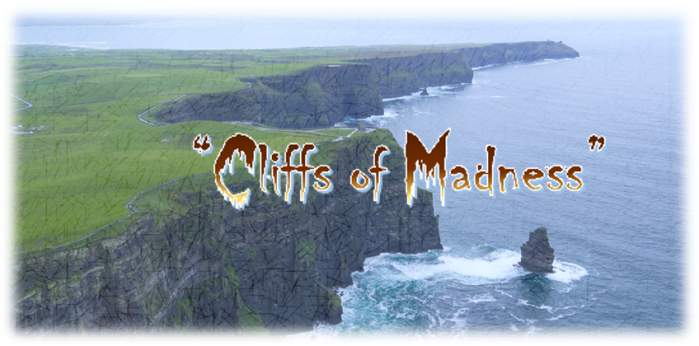






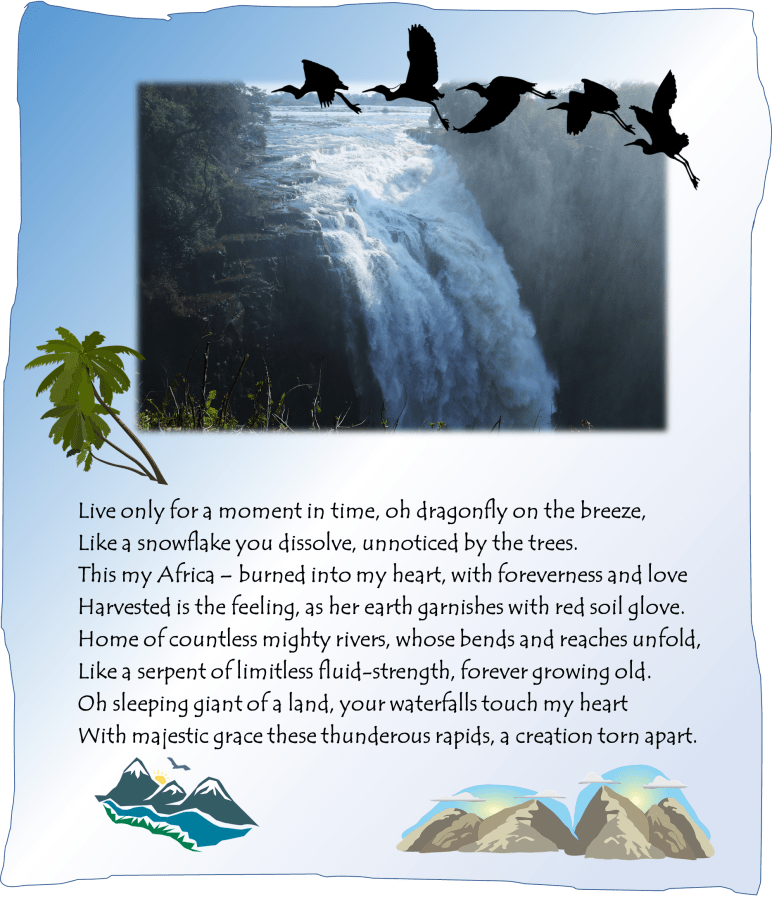
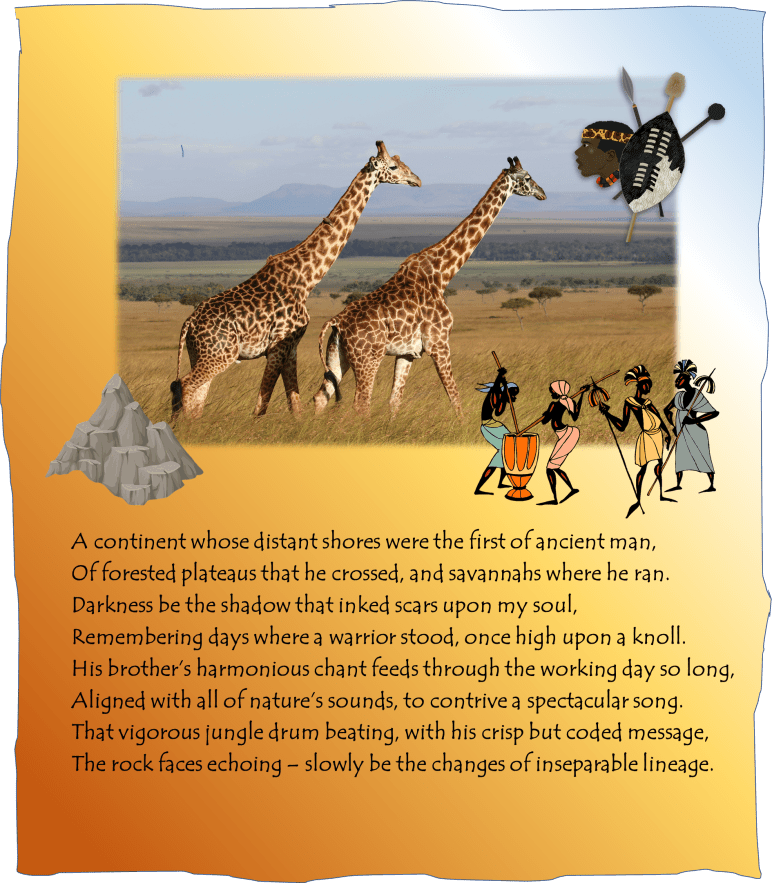
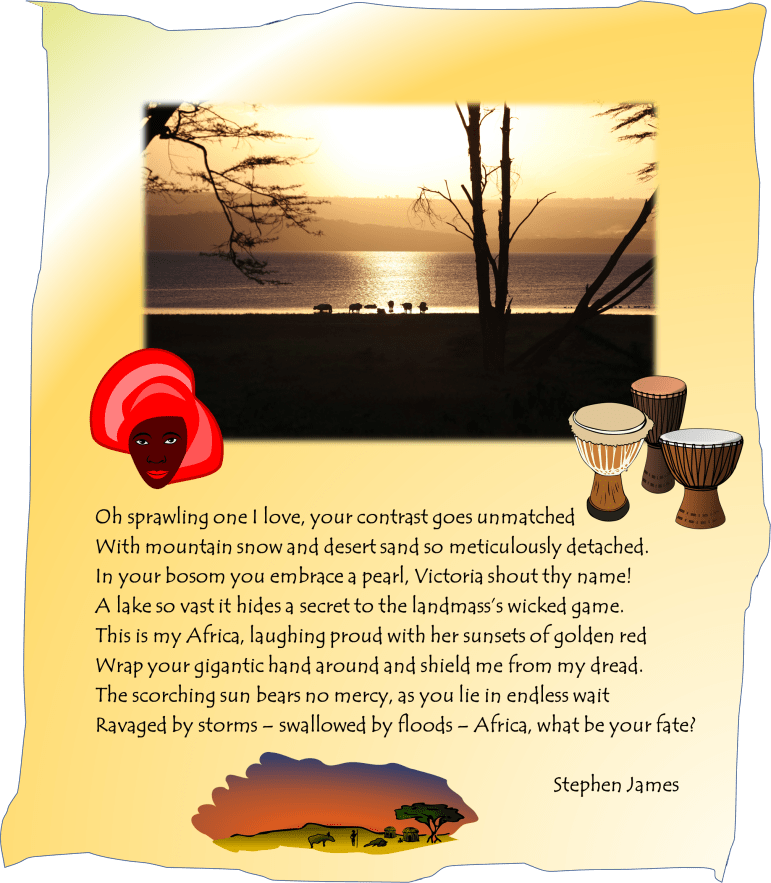
 The Gates of Magumembo lay agape behind the party of artefact expeditionary members. The exposed chasm between the towering rock faces, offered a biblical backdrop, beyond which sprawled Africa’s majestic, untamed, wilderness landscape. They’d clambered down the stone steps and gathered at the jaws of the repository.
The Gates of Magumembo lay agape behind the party of artefact expeditionary members. The exposed chasm between the towering rock faces, offered a biblical backdrop, beyond which sprawled Africa’s majestic, untamed, wilderness landscape. They’d clambered down the stone steps and gathered at the jaws of the repository. When striking a literary chord… the word Africa exposes the raw emotions of romance, adventure, treasure, lust, murder, jealousy and of course, mystery. All have a perfectly resonating allure — making even the deafest of ears prick straight up. We all love a great story, especially when good triumphs over evil. But what if you were one of the evil ones?
When striking a literary chord… the word Africa exposes the raw emotions of romance, adventure, treasure, lust, murder, jealousy and of course, mystery. All have a perfectly resonating allure — making even the deafest of ears prick straight up. We all love a great story, especially when good triumphs over evil. But what if you were one of the evil ones?